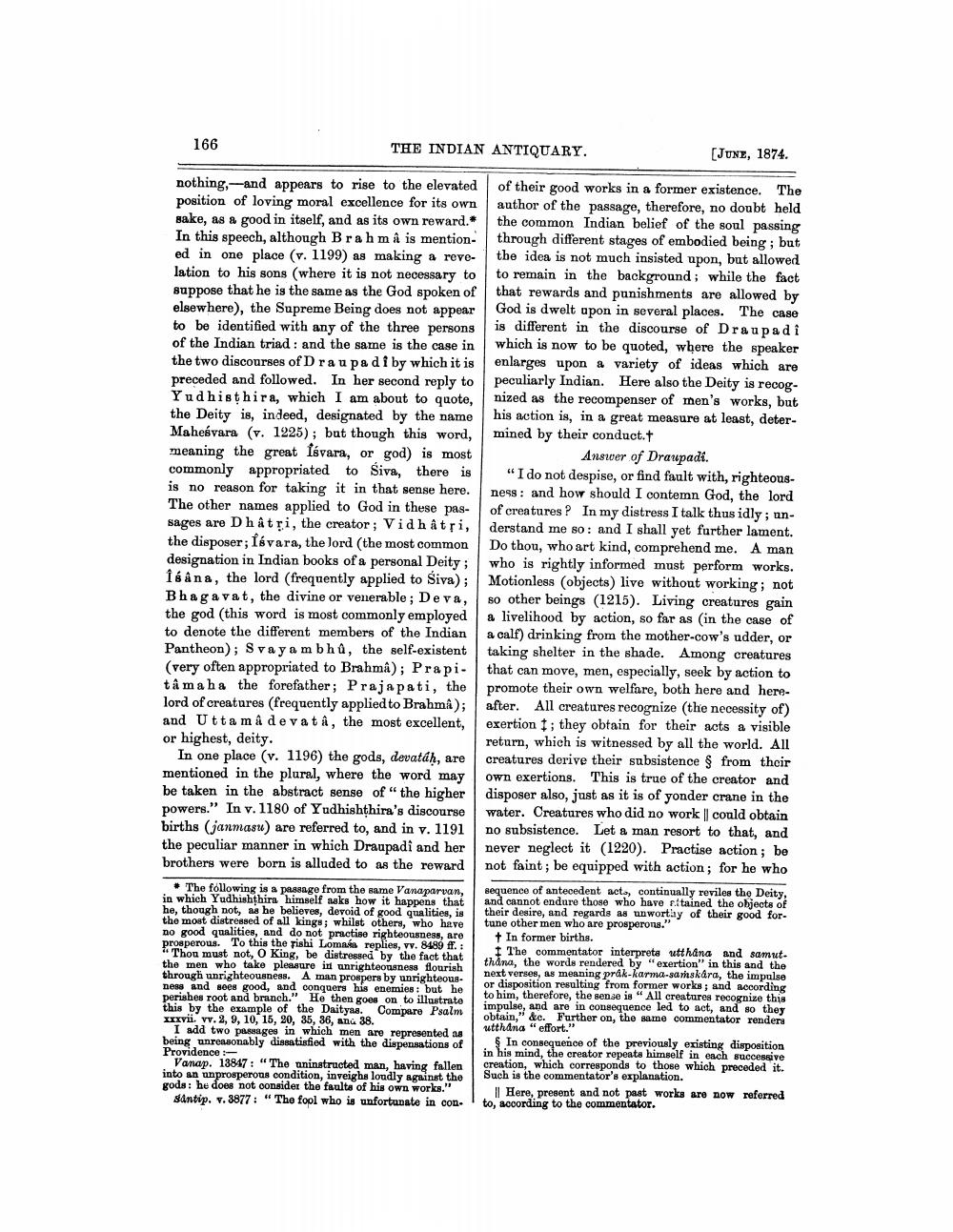________________
166
THE INDIAN ANTIQUARY.
nothing, and appears to rise to the elevated position of loving moral excellence for its own sake, as a good in itself, and as its own reward.* In this speech, although Brahm â is mentioned in one place (v. 1199) as making a revelation to his sons (where it is not necessary to suppose that he is the same as the God spoken of elsewhere), the Supreme Being does not appear to be identified with any of the three persons of the Indian triad: and the same is the case in the two discourses of Draupadi by which it is preceded and followed. In her second reply to Yudhisthira, which I am about to quote, the Deity is, indeed, designated by the name Maheśvara (v. 1225); but though this word, meaning the great févara, or god) is most commonly appropriated to Siva, there is is no reason for taking it in that sense here. The other names applied to God in these passages are D hâtri, the creator; Vidhâtri, the disposer; févara, the lord (the most common designation in Indian books of a personal Deity; Îéâna, the lord (frequently applied to Siva); Bhagavat, the divine or venerable; Deva, the god (this word is most commonly employed to denote the different members of the Indian Pantheon); Svayambhû, the self-existent (very often appropriated to Brahmâ); Prapitâ maha the forefather; Prajapati, the lord of creatures (frequently applied to Brahmâ); and Uttam â devatâ, the most excellent, or highest, deity.
In one place (v. 1196) the gods, devatáḥ, are mentioned in the plural, where the word may be taken in the abstract sense of "the higher powers." In v. 1180 of Yudhishthira's discourse births (janmasu) are referred to, and in v. 1191 the peculiar manner in which Draupadi and her brothers were born is alluded to as the reward
The following is a passage from the same Vanaparvan, in which Yudhishthira himself asks how it happens that he, though not, as he believes, devoid of good qualities, is the most distressed of all kings; whilst others, who have no good qualities, and do not practise righteousness, are prosperous. To this the rishi Lomasa replies, vv. 8489 ff.: Thou must not, O King, be distressed by the fact that the men who take pleasure in unrighteousness flourish through unrighteousness. A man prospers by unrighteousness and sees good, and conquers his enemies: but he perishes root and branch." He then goes on to illustrate this by the example of the Daityas. Compare Psalm xxxvii. vv. 2, 9, 10, 15, 20, 35, 36, and 38.
I add two passages in which men are represented as being unreasonably dissatisfied with the dispensations of Providence
Vanap. 13847: "The uninstructed man, having fallen into an unprosperous condition, inveighs loudly against the gods: he does not consider the faults of his own works." Santip. v. 3877: The fool who is unfortunate in con
[JUNE, 1874.
of their good works in a former existence. The author of the passage, therefore, no doubt held the common Indian belief of the soul passing through different stages of embodied being; but the idea is not much insisted upon, but allowed to remain in the background; while the fact that rewards and punishments are allowed by God is dwelt upon in several places. The case is different in the discourse of Draupadi which is now to be quoted, where the speaker enlarges upon a variety of ideas which are peculiarly Indian. Here also the Deity is recognized as the recompenser of men's works, but his action is, in a great measure at least, determined by their conduct.†
Answer of Draupadi.
"I do not despise, or find fault with, righteousness and how should I contemn God, the lord of creatures? In my distress I talk thus idly; understand me so: and I shall yet further lament. Do thou, who art kind, comprehend me. A man who is rightly informed must perform works. Motionless (objects) live without working; not so other beings (1215). Living creatures gain a livelihood by action, so far as (in the case of a calf) drinking from the mother-cow's udder, or taking shelter in the shade. Among creatures that can move, men, especially, seek by action to promote their own welfare, both here and hereafter. All creatures recognize (the necessity of) exertion ; they obtain for their acts a visible return, which is witnessed by all the world. All creatures derive their subsistence § from their own exertions. This is true of the creator and disposer also, just as it is of yonder crane in the water. Creatures who did no work || could obtain no subsistence. Let a man resort to that, and never neglect it (1220). Practise action; be not faint; be equipped with action; for he who
sequence of antecedent acts, continually reviles the Deity, and cannot endure those who have attained the objects of their desire, and regards as unworthy of their good fortune other men who are prosperons."
In former births.
The commentator interprets utthana and samut thana, the words rendered by "exertion" in this and the next verses, as meaning pråk-karma-samskara, the impulse or disposition resulting from former works; and according to him, therefore, the sense is "All creatures recognize this impulse, and are in consequence led to act, and so they obtain," &c. Further on, the same commentator renders utthana "effort."
In consequence of the previously existing disposition in his mind, the creator repeats himself in each successive creation, which corresponds to those which preceded it. Such is the commentator's explanation.
Here, present and not past works are now referred to, according to the commentator.




